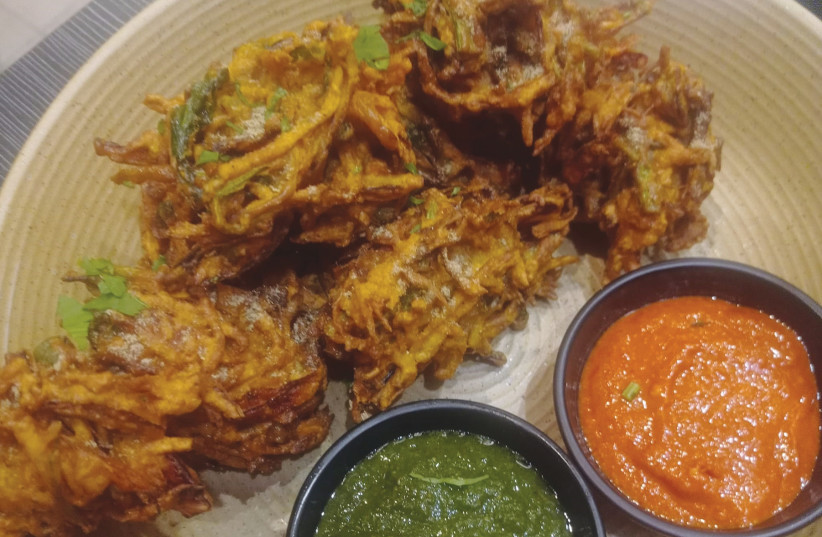When my oldest son Uriel was two years old, we spent a year in Palo Alto, California while I was on a journalism fellowship at Stanford University. He went to a wonderful day care facility run by an Indian woman who made vegetarian Indian food every day for lunch.
Often, when it came time for dinner, he would ask for “roti!” – an Indian bread that she often made. I would explain that I didn’t know how to make roti, but he would just raise his voice and ask louder, eventually dissolving into tears.
Today, my son owns a falafel food truck in Hawaii and I still don’t know how to make roti. But if you’re craving Indian food in Jerusalem, look no further than the three-week-old Ichikanda. The design is fun and casual and very Indian.
The portions are large. We were three people and came hungry, and were served two starters and two main dishes. We left stuffed.
Fantastic Indian food in Jerusalem
From the starters we tried the Samosa and the Pakora. The samosa (NIS 45) which is probably one of the best-known Indian snacks, are triangular pastries filled with potatoes and green peas. They were served with a sweet-and-sour tamarind sauce, and a slightly spicy green chutney. There was not a trace of oil in the samosas and they came piping hot. Our second appetizer was a large plate of pakora (NIS 49) and were mixed vegetables in a crispy lentil tempura and came with the same sauces as the samosa. Also delicious.

From the main dishes, we tasted the Malai Kofta (NIS 65) and the Palak Paneer (NIS 75). The Malai Kofta were potato and paneer cheese dumplings served in a curry and cashew sauce, drizzled with fresh cream, and served with rice. I’ve had this dish in various restaurants, both in Israel and abroad, and this was easily the best version. After we finished the three kofta balls, we kept eating the sauce over rice. The Palak paneer were pieces of paneer cheese in a green curry stew. It was spiced gently and a pleasure to eat. The garlic nan (NIS 15) was pleasantly addictive.
With this food we drank traditional lassis (NIS 25), a large glass of a yogurt-based beverage with spices. To finish off the meal, we had a small cup of masala chai, the Indian black tea with milk, aromatic herbs, and spices.
Chef Nik is from Rajasthan and came to Israel ten years ago. He said he was always interested in cooking and learned from his grandmother. Many of the Hindus in Rajasthan are vegetarian, which is why he and his wife and business partner Chaya, decided to make the restaurant dairy. Chaya says that many of the dishes can easily be made vegan.
Also, the restaurant is clearly proof that the Messiah is on the way. Their third business partner is Talia Asher, Chaya’s mother, and Nik’s mother-in-law. And at least so far, they haven’t killed each other.
Ichikanda
Hillel 24
Hours: Sunday – Thursday 11 am – 10 pm, Friday 11 – 3 PM
Phone: 0528000686
Kashrut: Tzohar
The writer was a guest of the restaurant.
